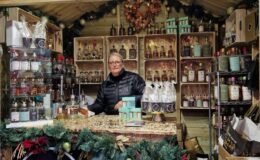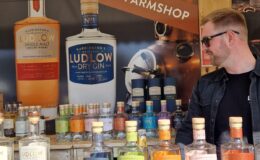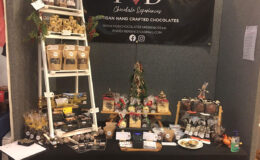Non alcoholic drinks
Data from reported by Nielsen in 2018 showed that the value of non-alcoholic wine in the UK rose by 66% in 2017 (the last year of reporting available), while no-ABV beer showed 37% value growth.
One interesting factor is the fact that thanks to the large amount of health studies on drinking one in four adults in the UK have cut down on their alcohol purchases, according to Mintel.
Beer is leading the pack. Around 1.4m UK households bought low- or no-alcohol beers in the past year, according to a recent report by Kantar Worldpanel, a 57% increase in two years.
Spirits have also seen innovation, with the launch of premium non-alcoholic ‘spirit’ Seedlip, while gin brand Gordon’s released its own ready-made low-ABV drinks this year, styled on a classic G&T. Meanwhile a number of breweries that specialise in lower ABVS (between 1% and 2.5%), such as south London’s Small Beer Co., have launched in the past 12 months.
The UK government is looking into ways to modify the current labelling for low and non-alcoholic drinks, but experts say that, when it comes to beer and spirits, ‘lower’ is the space to watch.
Organic, natural, biodynamic and vegan wines
One stand-out feature of the wine trade this year has been the raised profile of organic, natural, biodynamic and vegan wines in supermarkets and wholesalers such as Majestic Wine. The Co-op stepped up its vegan wine offering at the start of the year. The supermarket has worked with winemakers around the globe to develop a range of vegan-friendly fining agents used to filter wines and improve the clarity of the final drop, providing an alternative to traditional additives such as egg white or isinglass, which is derived from fish.
The reality is that many wines are already vegan, but the rising interest in vegan food has led producers and retailers to use this as a sales tool. Last October Majestic Wine added vegan and vegetarian symbols to its wine labels and on its website, and now boasts 32 vegan-friendly bottles in its portfolio.
Organic wine is also expected to see further growth. These expressions only represent 2.2% of the British wine market, according to a study published at French trade show Millésime Bio, but the category could rise by more than 14%. Sales of eco-friendly vino are also up by 36% year-on-year at Waitrose.
Dark spirits
Dark spirits are having a moment in the sun, and rum was the flavour of 2018 and this could be set to continue. The WSTA claims that rum sales broke the £1bn mark at the end of March 2017, while retail analyst Mintel said that dark, golden and spiced rum put in a “strong performance” over previous months, with off-trade value sales up by a third, and volumes rising by 27%. Artisan producers, 55 Above Limited, demonstrate this trend as their Toffee Rum became a best seller in 2018. WSTA’s figures found that there are now 150 rums in the UK market, compared with just 50 a decade ago. This is attributed to the rise in popularity down to increased consumer interest in craft cocktails.
Pink gins et al
This was the year that gin blushed. Over the past eight to 10 months, the gin category has seen high-profile big-brand launches, kicking off with Gordon’s Pink in September 2017. This was followed by Beefeater Pink in February 2018, Tanqueray’s Flor de Sevilla and basil-flavoured O’ndina gin from Campari in April andTanqueray’s Lovage in May. The visual appeal of pink gin, representing fun and spontaneity, has helped to make gin more accessible but pink is just the start – last month discount grocer Aldi launched a gin by Scottish distiller McQueen that changes colour when tonic water is added, from sapphire blue to pale pink.
Craft beer and spirits
Craft beer and spirits are still booming, but drinkers and retailers alike are keener than ever to make sure what they’re buying is the real deal.
When it comes to the craft side of the spirits category, gin is the clear success story. William Grant & Sons revealed that 82 new gin labels entered the UK market in 2017 alone. At the end of last year one new gin, Fifth Spire, distilled by two friends in a bedroom in Litchfield, Staffordshire, won a double gold award at the San Francisco International Spirits Competition. Selfridges Birmingham, started selling it for £40 per bottle at the end of last year.
Retailers are showing a continued and still-growing interest in stocking craft-focused drinks, but as smaller brewers and distillers continue to fill the shelves, major firms must keep their newly acquired brands’ identities clear. Craft producers are becoming smaller, and there’s less room for drinks giants to hide their influence.
Champagne
According to Nielsen’s latest research, the volume of Champagne sold in the UK has suffered a 20% decline in volume and 11% fall in value, bringing the amount of bottles sold through UK retailers down from 16.7m in 2016 to 13.3m in the last reporting timescale. This decrease comes on the back of a 3 million-bottle decline during 2016, when the UK market shrunk from 34m to 31m.
The cause of such a drop in Champagne sales in the UK is threefold, according to commenters, the blame being threefold – societal changes in Britain, a rise in prices for the French fizz, and an altered approach to selling the product in the UK’s major retailers. Although the whole mass market looks diminished according to Neilsen it should however be pointed out that the situation is considerably less negative for premium brands – viewing the UK through the lens of Nielsen statistics does not provide a complete picture of the market, because the data analyst captures the trends in mass retail, where price increases on exclusive-label Champagne have had the greatest impact in the statistics – there has been a 12% rise in price in this sector as a result of Sterling’s devaluation against the Euro following Brexit uncertainties.
UK Industry commenters say they need Champagne to be more vocal about the great things that apply to all Champagne, and currently, a lot of that work is being left to the major brands to do, and while they are doing that well, and holding up the category, there is a lot more that could be done across the board.






